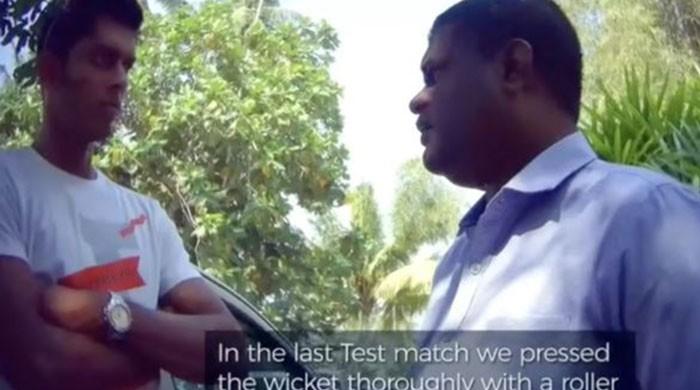Undercover investigation reveals plot to fix England vs Sri Lanka Test


A covert investigation has exposed a plot to fix England’s Test against Sri Lanka in Galle later this year.
An undercover journalist, posing as a businessman looking to place bets, caught a match fixer and the groundsman in Galle agreeing to rig the outcome of England’s first Test on Sri Lanka tour scheduled on November 6, the Telegraph revealed.
The “wicket fixing” plot that the two were filmed to be discussing involved doctoring the pitch to make it virtually impossible for the contest to end in a draw. Such tactics would allow those involved to profit dishonestly from placing bets against that outcome with unsuspecting bookmakers.
The match-fixing allegations come from a documentary entitled Cricket’s Match-fixers, to be broadcast by Arab channel Al Jazeera on Sunday, May 27.
According to reports, the film footage features Robin Morris, a former professional cricketer from Mumbai, India, Tharindu Mendis, a professional player from Colombo, and Tharanga Indika, an assistant manager at Galle International Stadium, discussing doctoring pitches during a meeting with an undercover reporter prior to the announcement of the date of the Sri Lanka Test at the Galle ground.
Asked when the next such fix would be carried out there, Morris replies: “England vs Sri Lanka. It’s in October, England vs Sri Lanka.”
When the reporter says, “The next one he [Indika] will doctor the pitch for is Sri Lanka versus England?”, Mendis nods his head.
Asked if he could fix the surface for the England match so a draw would be impossible, Indika replies: “Yes, I can. I can confirm it in advance one week before.”
When the subject of ensuring the Sri Lanka v England Test would be finished inside four days is raised during a second meeting, Indika says, laughing: “I can do it in two-and-half.”
The reporter also asks Indika if he could keep the knowledge of pitch-doctoring within a small circle of people and prevent any leaks, the groundsman replies, “Yeah, sure”, adding that he trusted only “three or four” members of his 17-strong ground staff to help him.
Explaining how he could produce a surface that would make a draw all but impossible, he says: “We leave the wicket uncovered for about two weeks. Don’t water it and this will cause damage to the wicket.”
Mendis says other ways to fool pitch inspectors sent to every international match by the sport’s governing body, the International Cricket Council (ICC), include watering the pitch for half as long as necessary and using a special “brush” during the game itself.
Indika confirms he could produce a pitch to favour either bowlers or batsmen, saying: “Yes, if you want a pitch for spin bowling or pace bowling or batting, it can be done.”
According to the match-fixer Morris, Indika had already doctored the wicket for the most recent Test played at Galle in July between Sri Lanka and India.
Indika adds of the match, which the tourists won by 304 runs inside four days after posting a massive 610 runs in their first innings: “India was set for a batting wicket. Our guys didn’t play well.”
Morris can then be seen to gesture towards Indika who is the groundsman saying, “what happens is he – we – can make a pitch to do whatever we want it to do. Because he’s the main curator. He is the assistant manager and curator of the Galle stadium.
“We hit 10 bookies in one go,” he reveals.
He also claims doctoring a pitch to suit bowlers is safer than for batsmen as “batsmen can make mistakes”.
The ICC has opened an investigation into the scandal after learning about the latest match-fixing scandal to hit the world of cricket.
According to Alex Marshall, the head of ICC’s Anti Corruption Unit, “as you would expect, we will take the contents of the programme and any allegations it may make very seriously.”
On the other hand, England and Wales Cricket Board spokesman said: “ECB are aware of the planned Al Jazeera documentary, though not the full content. We endorse the ICC’s position and fully support their work and investigations.”
England are currently in the midst of two-match Test series against Pakistan.




